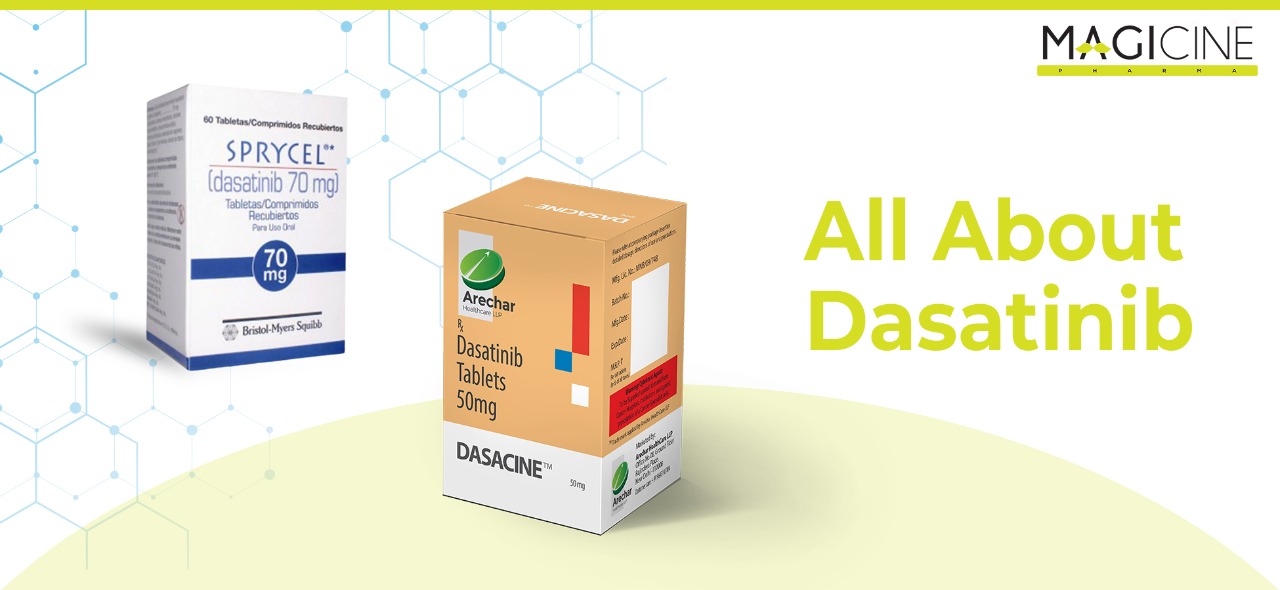
Dasatinib is a targeted therapy (cancer growth blocker). It is marketed as Sprycel and Dasacine among others. It is indicated to treat and manage certain blood cancers. This drug is available in the strength of 50mg in the form of tablets.
FDA Approval History:
For Chronic-Phase Chronic Myeloid Leukemia: Jan 2, 2019
For Philadelphia Chromosome-Positive Acute Lymphoblastic Leukemia: Nov 9, 2007
Uses
Dasatinib is an oral dual BCR (breakpoint cluster region) tyrosine kinase inhibitor used in the treatment of patients with:
- Newly diagnosed Philadelphia chromosome-positive CML (Chronic Myeloid Leukemia) in chronic (long-lasting) phase.
- Chronic, accelerated, or myeloid or lymphoid blast phase Philadelphia chromosome-positive Chronic Myeloid Leukemia (CML) with evidence of intolerance or resistance to prior Imatinib treatment.
- Philadelphia chromosome-positive Acute Lymphoblastic Leukemia with evidence of intolerance or resistance to prior therapy.
Working
Dasatinib works by interfering with the action of specific enzymes that stimulate cancer growth in the tissues.
- STEP-1
Tyrosine Kinases: These are the enzymes responsible for transferring a phosphate group from ATP to the tyrosine residues of various proteins inside a cell. - STEP-2
Dasatinib Enters: Dasatinib inhibits a number of kinases including BCR-ABL, SRC family (SRC, LCK, YES, FYN), c-KIT, EPHA2, and PDGFRβ at nanomolar concentrations. - STEP-3
Cell Death: It eventually inhibits the growth of acute lymphoblastic leukemia and chronic myeloid leukemia cell lines overexpressing BCR-ABL. This leads to cell death.
Side Effects
Dasatinib may show adverse effects in patients during the therapy period. Below are some of them as per the clinical trials and post-marketing results. Usually, oncologists prescribe over-the-counter drugs to manage them.
Common side effects
- Fainting
- Dizziness
- Ear congestion
- Constipation
- Sore throat
- Pale skin
- Chills
- Bleeding gums
- Nosebleeds
- Weight gain
- Blood in stools
- Excessive sneezing
Rare side effects
- Blurred vision
- Diarrhea
- Severe chest pain
- Red eyes
- Irregular heartbeat
- Muscle or joint pain
- Pounding in the eyes
- Swelling on the arms
- Increased sweating
- Skin discoloration
- Mouth sores or ulcers
Warnings & Precautions
- Pregnancy
When given to a pregnant female, Dasatinib can lead to fetal harm to the baby. Women of childbearing potential are thus advised to avoid unwanted pregnancy during the therapy. - Breastfeeding
During treatment with Dasatinib, doctors advise avoiding breastfeeding. Though it’s not known whether this drug gets excreted into mother’s milk. - Pediatric Use
The safety and effectiveness of Dasatinib have not been established yet in patients aged below 18 years. - Geriatric Use
As per the clinical studies, this drug can cause greater toxicity in patients aged above 65 years. Though no major differences in its effectiveness were noted. - Myelosuppression
During the treatment with Dasatinib, some patients may experience myelosuppression. Patients must be made aware of the possibility of low blood cell counts. - Fluid Retention
Symptoms like difficulty in breathing, fainting, and weight gain must not be ignored during the therapy period. Patients experiencing such symptoms must be monitored for bleeding fluid retention. In fact, they must be made aware of the same prior to the therapy. - QT Prolongation
Experts believe that Dasatinib can lead to cardiac ventricular repolarization in some patients. Its symptoms must be reported immediately for dose modifications or therapy discontinuation.
Interactions
Because of interactions, your doctor may ask about the medicines you already take and your medical history. These details help make the necessary dose modifications.
Interaction with medicines: Drugs that may interact with Dasatinib may include acalabrutinib, enoxaparin, clarithromycin, dolasetron, indinavir, and fosamprenavir. Though other medicines may also interfere with its working. It is important to make the doctor aware of the drugs you already take.
Interaction with diseases: Below are some diseases that are known to interact with Dasatinib. Patients may require dose adjustments in the following cases:
- Cardiovascular disease
- Hepatic impairment
- Fluid retention
- QT prolongation
- Bone marrow suppression
- Pulmonary arterial hypertension
Interaction with alcohol and food: Studies show that Grapefruit can interact with Dasatinib and change the effects of the drug. It is advisable to avoid its consumption during the therapy. Moreover, alcohol may also cause serious interactions.
Overdose
The recommended dose of Dasatinib for chronic phase Chronic Myeloid Leukemia is 100mg (two tablets taken orally). And, the starting dose for patients with Ph+ Acute Lymphoblastic Leukemia remains 140mg. The dosage for pediatric patients, however, differs in accordance with the body weight.
Overdose on Dasatinib may lead to symptoms like drowsiness, fainting, and severe chest pain. If such a situation occurs, immediate medical support is advised. The treatment of overdose involves primary supportive care.
NOTE: This information is only for informational purposes. Do not misinterpret the role of Dasatinib or change your dose due to something you’ve read here. Follow your doctor’s prescription.





